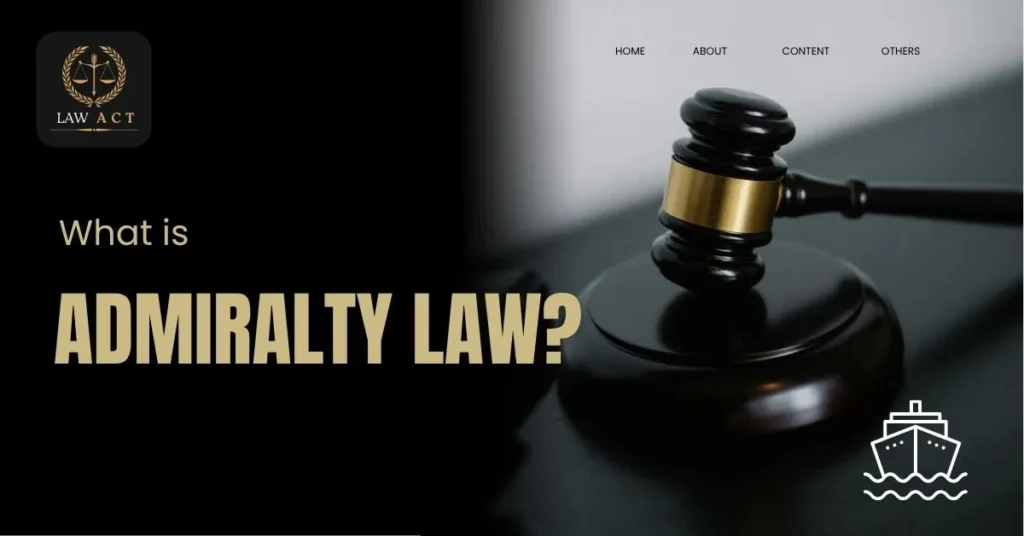Admiralty law, also known as maritime law, is a special branch of law that deals with issues, disputes, and regulations connected to ships, navigation, seas, oceans, and waterways. It plays a very important role because the world relies heavily on sea trade and transport. Almost 90% of global trade happens through ships. Without admiralty law, it would be very difficult to manage shipping, safety at sea, international trade rules, and the rights of people working on ships.
This law has been in existence for hundreds of years and has developed with time as trade and shipping increased across the world. Many countries follow international standards of admiralty law while also having their own national rules. If you want to understand how trade, fishing, or shipping operates legally across oceans, you must know the basics of admiralty law.
Meaning of Admiralty Law
Admiralty law is a set of legal rules that governs everything related to maritime activities. It covers the rights of ship owners, duties of crew members, rules of shipping companies, and safety measures that must be followed. In simple words, admiralty law ensures smooth and fair use of the world’s oceans for trade, transport, and other purposes.
Unlike normal laws that only work inside a country, admiralty law often crosses borders. This is because oceans are not owned by one country; they are shared by many nations. Therefore, international agreements are made to make sure ships can travel safely from one part of the world to another without legal confusion.
History of Admiralty Law
The history of admiralty law is very old. The earliest forms of maritime law can be traced back to ancient Greece, Rome, and other early civilizations. As trade grew, these civilizations created rules to solve disputes about cargo, sailors, and damages at sea.
During the medieval period, Europe created many sets of maritime rules, such as the “Rhodian Sea Law” and the “Laws of Oleron.” These became the foundation of modern admiralty law. Over time, countries such as England and the United States shaped strong maritime legal systems that are still followed today. Admiralty law is now recognized as a global legal field that balances national and international interests.
Importance of Admiralty Law
Admiralty law is important for many reasons. Oceans are vast and international trade cannot happen smoothly without common rules. This law provides solutions to many problems such as:
- Who is responsible if a ship damages another ship?
- What happens if cargo is lost during transportation?
- How should sailors be treated under employment contracts?
- What happens when there is a pollution accident at sea?
- How to divide profits from fishing activities in international waters?
Without admiralty law, these issues would create endless disputes and stop global trade from working properly.

Main Areas Covered by Admiralty Law
Admiralty law covers many subjects related to the sea. Some of the most important areas include:
1. Shipping and Trade Rules
Ships carry goods between countries. Admiralty law ensures that shipping contracts are fair, delivery is safe, and disputes between shippers and cargo owners are solved properly.
2. Accidents at Sea
Accidents are common on oceans due to weather, technical problems, or human mistakes. Admiralty law provides a system to decide responsibility for damages, injuries, or losses caused by such accidents.
3. Marine Insurance
Marine insurance is a big part of admiralty law. Ship owners, cargo owners, and shipping companies often insure their goods and vessels against risks such as storms, accidents, or piracy.
4. Seafarers’ Rights
Sailors and crew members have specific rights, such as proper wages, safe working conditions, and medical care. Admiralty law ensures they are not exploited by ship owners.
5. Environmental Protection
Pollution at sea, like oil spills, can harm marine life and coastal areas. Admiralty law makes rules to prevent pollution and punishes those responsible for damaging the environment.
6. Piracy and Illegal Activities
Piracy, smuggling, and illegal fishing are major concerns in some parts of the world. Admiralty law creates systems to fight these crimes and protect lawful ships.
Admiralty Law vs. Common Law
To make it easier to understand, let us look at the difference between admiralty law and common law (the law most countries use on land).
| Point | Admiralty Law | Common Law |
|---|---|---|
| Scope | Deals with seas, oceans, ships, navigation, and maritime trade | Deals with land-based disputes, property, business, and personal rights |
| International Use | Often applies across countries due to international agreements | Mostly applies within one country |
| Special Courts | Many countries have special admiralty courts | Regular courts handle common law cases |
| Focus | Protects trade, shipping, and seafarers | Protects citizens, businesses, and national issues |
This table shows that admiralty law is unique and more international in nature compared to normal legal systems.
Admiralty Law in the United States
The United States has a well-developed admiralty law system. U.S. federal courts handle most maritime cases. These courts deal with disputes about shipping contracts, accidents at sea, injuries of sailors, and international trade rules.
For example, the U.S. follows the Jones Act, which protects the rights of seafarers and allows them to seek compensation if they are injured while working on ships. The U.S. system is very influential and has inspired other countries to strengthen their maritime legal systems.
Admiralty Law in International Context
Because oceans connect all countries, admiralty law has a strong international side. Agreements such as the United Nations Convention on the Law of the Sea (UNCLOS) provide common rules for navigation, fishing rights, territorial waters, and environmental responsibilities.
International organizations like the International Maritime Organization (IMO) also make global safety and pollution-control rules. These rules are followed by most countries to avoid confusion.
Real-Life Examples of Admiralty Law
- Cargo Dispute: If a shipping company fails to deliver goods safely and the cargo is damaged, admiralty law helps solve the dispute between the cargo owner and the ship operator.
- Oil Spill Case: When an oil tanker causes a spill, admiralty law decides how the cleanup costs and damages should be paid.
- Sailor’s Injury: If a crew member gets injured due to poor safety measures, admiralty law ensures he can claim proper compensation.
These examples show how admiralty law is not just theory but affects real lives and businesses every day.
Conclusion
Admiralty law is one of the most important areas of international law. It ensures fair and safe use of the oceans for trade, travel, and employment. It protects ship owners, crew members, cargo owners, and even the environment. Without it, global trade would face endless confusion and disputes.
Understanding admiralty law helps us realize how oceans are managed and why international cooperation is necessary. Whether it is about shipping contracts, accidents at sea, or protection of sailors’ rights, admiralty law provides the foundation for order on the world’s waters.
Also Read:
- What Are Property Solicitors?
- Explore All About 1099 Contractor
- IRS Form 5472: Filing Requirements, Rules, and Penalties
- Section 10 of the Income Tax Act
- Section 1 of the Income Tax Act
- Section 54 of Income Tax Act
Who follows admiralty law internationally?
Admiralty law is followed by countries around the world for shipping and trade. International agreements and conventions, like UNCLOS, guide countries to manage oceans, protect sailors, and regulate trade. This law works across borders to avoid disputes at sea.
What areas does admiralty law cover?
Admiralty law covers shipping contracts, marine accidents, crew rights, cargo disputes, insurance, piracy, and environmental protection. It also includes rules for international trade, safe navigation, and proper treatment of sailors working on ships across the world.
How does admiralty law protect sailors?
Sailors and crew have rights under admiralty law. It ensures fair wages, safe working conditions, medical care, and compensation for injuries. Laws like the Jones Act in the U.S. give sailors legal protection if they face accidents while working on ships.
What is the difference between admiralty law and common law?
Admiralty law deals with oceans, ships, and international trade, while common law focuses on land-based issues like property and personal rights. Admiralty law often applies across countries, and many nations have special courts to handle maritime disputes.
How are accidents at sea handled legally?
Accidents at sea are resolved under admiralty law. It decides who is responsible for damages, injuries, or cargo loss. This law ensures that ship owners, cargo operators, and injured sailors can receive proper compensation according to fair legal procedures.
Does admiralty law cover environmental issues?
Yes, admiralty law covers pollution, oil spills, and other environmental damage at sea. It provides rules to prevent harm and holds ship owners or companies accountable. Protecting marine life and coastal areas is a key part of this legal system.
What is marine insurance under admiralty law?
Marine insurance is a type of coverage for ships, cargo, and sailors against risks like storms, accidents, or piracy. Admiralty law ensures that these insurance agreements are fair, legal, and help ship owners and cargo operators recover losses safely.
Are piracy and smuggling addressed by admiralty law?
Yes, admiralty law deals with piracy, smuggling, and illegal activities at sea. It provides rules to punish offenders, protect lawful ships, and maintain safety in international waters. These laws help reduce crimes and protect global shipping.


